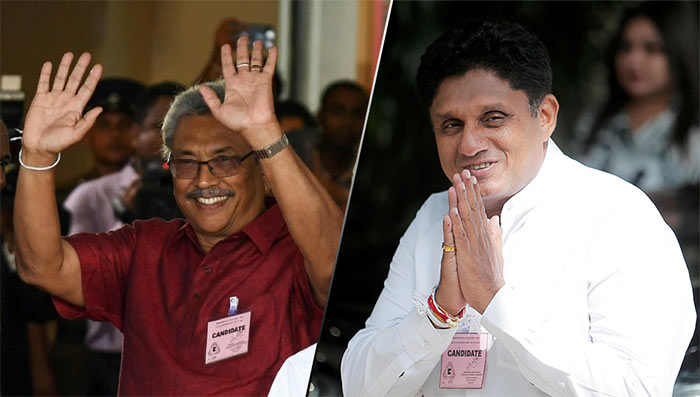Concerns over fake news, disinformation ahead of Sri Lanka polls

As candidates made their final pitch, some of their supporters unleashed unambiguously racist posts and fake news-based attacks online – mostly on Facebook, WhatsApp and Twitter.
The campaign for Sri Lanka’s November 16 presidential election ended on Wednesday, but voters are concerned about an apparent spike in fake news on social media, and its possible impact over the next two days.
As candidates made their final pitch, some of their supporters unleashed unambiguously racist posts and fake news-based attacks online – mostly on Facebook, WhatsApp and Twitter. Users and media watchers are intervening in different ways — from asking Facebook how it allowed politicians to promote content found to be false, to instantly calling out racist slurs and hate-mongering by users who are openly backing prominent contestants.
Mainstream media too came into sharp focus days ahead of Sri Lanka’s biggest election, for bias or disinformation.
Addressing a media conference on Wednesday, Chairman of the Election Commission Mahinda Deshapriya said this was the “most partisan” media behaviour he had seen in any Sri Lankan election. “Their only objective seems to be victory for their candidate at any cost,” he said, sharing details of uneven air-time and space given to different candidates.
Meanwhile, popular English daily Ceylon Today and its Sinhala counterpart Mawbima ran front-page stories on Wednesday, with the headline ‘Sinhalese can be defeated only by voting for Sajith [Premadasa], attributed to Tamil legislator M.A. Sumanthiran. His party — the Tamil National Alliance (TNA) — is backing the ruling party’s candidate Mr. Premadasa, in what could be a close race with Gotabaya Rajapaksa, candidate from the oppositional camp.
Denying that Mr. Sumanthiran made such a statement, his lawyers wrote to the police and the Election Commission, demanding a criminal investigation of the “blatant falsehoods”. They also issued a letter of demand to the privately-owned newspapers that they said “appeared to support” Mr. Rajapaksa. The Hindu contacted Ceylon Today’s editorial board for a response. “We do not wish to comment,” a senior member said, requesting not to be named.
Keheliya Rambukwella, a spokesman for Mr. Rajapaksa said: “Fake news is a concern for all of us, especially since campaigning ends today. Sometimes when one side peddles it, the other side is compelled to respond. It is the ruling party that must a take a lead and stop it.”
According to media analyst Nalaka Gunawardene, three credible, independent media monitoring services – Ethics Eye, FactCheck.lk and AFP Fact Check – are now available in Sri Lanka. However, “none covers television or radio – which remain the primary sources of news and current affairs information for most Sri Lankans,” he said.
“While about a third of the population use social media, 86% of all households have TV. The top three, ratings-leading private channels are openly aligned with one or the other of the two main presidential candidates.”
Echoing prevalent concern over the likely increase in fake news before poll day, Mr. Gunawardene said: “Anything is possible during the cooling off period of 48 hours.”
The EC has taken the legalistic position that its media guidelines are mandatory only for state-owned media outlets, while leading private TV and radio networks are “bending, if not outright breaking” the guidelines, with no consequences so far. In regard to social media, neither the EC nor companies [like Facebook and Youtube] have been forthcoming with any specifics, analysts noted.
According to Mr. Gunawardene, Sri Lanka’s media landscape has evolved since the last presidential election in January 2015, with a third of country’s 21-million population online now. Like elsewhere, a host of reasons influence voter behaviour. “Social media create only ripples at the moment – but they have the potential to muddy or poison the whole ‘water’ of public psyche to an alarming extent,” Mr. Gunawardene warned.
(Source: The Hindu)
Latest Headlines in Sri Lanka
- Defence Secretary inspects NFTH following SLAF takeover February 23, 2026
- Sri Lanka Navy ship P628 begins historic 14,775 nautical mile voyage to Sri Lanka February 23, 2026
- Sri Lanka Police arrest suspects in major fraud case impersonating officers February 23, 2026
- Oxford Union cancels Namal Rajapaksa speech after student opposition February 23, 2026
- 100,000 Litro gas cylinders to be released today to ease shortages in Sri Lanka February 23, 2026



Fake news? Wow, minister Rajitha S took pains to organise and bring in front of the media a ‘white van kidnapper cum driver’ (who was disguised with fake beards etc.) who confessed to aiding and kidnapping many and taking them to their death, by being thrown into crocodile infested lakes, and he made this claim with Rajitha by his side and with many police officers present too and this is very serious as it talks about mass murder and we are stunned that the police did not arrest him instantly! As such, the CID must immediately step in and arrest this culprit and if the culprit is nowhere to be found (which we expect as we expect the sun to rise from the east tomorrow), Rajitha must be arrested and questioned for possibly being an accessory after-the-fact to this mass murder as it looks like he had this awareness of this mass murder before, but never did he approached the police with this knowledge but only saw it fit to bring this killer on election eve in front of the media, but still not present him to the police! I earnestly hope the seriousness of this event is not going to be forgotten by the AG’s office!